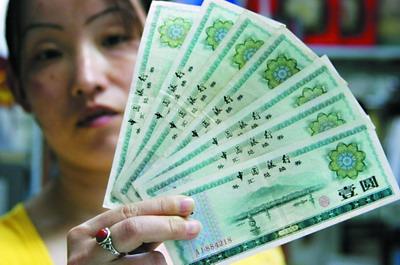Source: China Daily
12-05-2008 18:31
By Liu Weiling (China Daily)
In the morning of December 30, 1993, dozens of foreign ambassadors, their wives and anxious foreign businesspeople stormed into a duty-free store in the east of Beijing, packing their bags with anything they found on the shelves.
 |
| A woman holds up a sheaf of foreign exchange certificates (FECs), which were withdrawn from circulation on January 1, 1995 and the period for conversion ceased at the end of June 1995. |
In the morning of December 30, 1993, dozens of foreign ambassadors, their wives and anxious foreign businesspeople stormed into a duty-free store in the east of Beijing, packing their bags with anything they found on the shelves.
But the unusual shopping spree was not ignited by the New Year Eve rush, but instead by an unexpected overnight announcement from the central bank saying it would stop issuing foreign exchange certificates (FECs), a convertible version of renminbi used by foreigners in the mainland, from the beginning of 1994.
Although the People's Bank of China made it very clear that existing FECs could still be used temporarily, FEC holders believed the sooner they spent them the better.
The duty-free store in Jianguomen, located close to many embassies and office buildings, sold 9 times more goods than on a usual day.
"Business was even hotter than at Christmas," Dong Jixiang, manager of the store, told China Daily. "We may even have to cancel New Year's holiday tomorrow," he said at the time.
International companies in Beijing were also facing chaos in their offices. Many of the Chinese employees working for foreign companies were paid in FECs, which were supposedly equal in the value of yuan but were actually worth 30 percent more than renminbi yuan on black market.
They were keen to find out whether their bosses would compensate them if they were to be paid in renminbi in the future.
"We are getting burned," a clerk at the Beijing Office of Hong Kong Trade Development Council told the China Daily.
